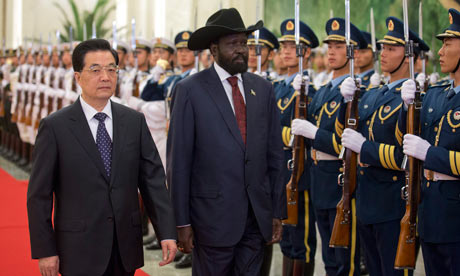China’s substantial investment in Africa’s development is controversial, with pundits and scholars keen to speculate on what is driving this spending spree. Moreover, it is unclear what the implications of this resource infusion will be for average citizens and elites in African countries. Many analyses to date look at this in broad, global terms. In this post, I take a step further, extrapolating Yun Sun’s framework for understanding China’s foreign policy in Africa to a case study of how its relations have evolved with South Sudan.
Sun, a Visiting Fellow with the Africa Growth Initiative at the Brookings Institution, has described China’s foreign policy in Africa as oscillating between four pillars – political, economic, ideological and strategic – since the 1950s. Politically, China seeks increased influence in multinational organizations and a firm commitment to the “One China” policy. Economically, China wants to secure natural resources and expand markets for exports. Ideologically, China wants to legitimize and popularize its own development model by promoting growth abroad. Strategically, Beijing seeks to develop the capacity to project force abroad in order to protect its citizen and capital throughout the continent.
China’s initial engagement with Africa was built around ideological solidarity with socialist regimes and competition against Taiwan for diplomatic recognition. In the 1990s, when Chinese elites began promoting investment abroad after two decades of internal economic reforms, the country’s priorities shifted to expanding access to new markets that would fuel its domestic growth. While China has been successful in deepening economic ties with African countries, many of its business practices have soured its relationship with some African elites and the public along the way. In her final analysis, Yun predicts that China will continue to prioritize short-term economic gains in Africa over long-term strategic partnerships.

South Sudan's President Salva Kiir with China's former President Hu Jintao at a welcoming ceremony in Beijing, China. Courtesy image: The Guardian (Adrian Bradshaw/EPA)
Building on Yun’s analysis, I see China’s evolving policy for engaging with South Sudan as an interesting case study for whether Beijing will be able to reconcile its disparate interests into one cohesive foreign policy. China faces an intractable political dilemma in its support of South Sudan. If it abandons the Kiir regime, it may jeopardize relationships with other autocratic governments who count on China’s protection in multinational organizations. However, if Beijing continues supporting the pariah state it will face ridicule from the international community. Moreover, China must balance the investments of Chinese corporations against the reputational costs of abandoning its policy of non-interference in another country’s internal affairs.
China’s increasingly active role as a bilateral mediator between the South Sudanese factions suggests that Beijing is moving away from its non-interference policy and toward a more flexible foreign policy. China’s role in the United Nations has also taken a turn in recent years. Before 2004, China used its position in the UN Security Council to obstruct international intervention in Darfur. Since 2011, however, China has played a major role in UN peacekeeping operations in South Sudan. When internal conflict between the rebels and President Kiir’s regime became a threat to the China National Petroleum Company’s investments in South Sudan, China stepped in as a mediator between factions.
The way in which China addresses the growing unrest in South Sudan will set an important precedent for its engagement in Africa over the next decade. China has already begun evacuating its citizens from South Sudan, but it does not have a way of protecting its substantial investments in the region from the violence. Although China lacks the capacity to execute a unilateral military intervention in the region, it may push the UN Security Council to intervene.
This would be a strong signal that China’s increased economic engagement with the continent is pushing it to move away from its old ideological tenets and toward a more flexible and pragmatic approach to foreign policy built around economic relationships. Conversely, if Beijing decides to abandon the South Sudanese regime and rely on other oil exporters, it will indicate that Chinese elites are working to reconcile their economic goals with their established ideological norms and political interests.
